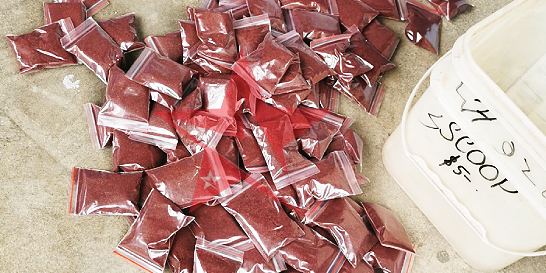Copen producers and vendors Gizo in the Western Province say they will continue to produce and sell copen—a locally made stimulant drug—unless copen is formally declared as an illegal substance under Solomon Islands law.
This comes amidst growing concern from public health officials, government leaders and some members of the public over the widespread consumption of copen, particularly among young people in towns like Gizo, Noro, Munda and Honiara.
The product, made primarily from tobacco mixed with colgate and other ingredients, is often sold in small plastic packaging cost around $3 to $5 dollars has become increasingly popular among youth.
According to speculations several copen vendors in Gizo said, they see no reason to stop selling the product because there is currently no law that bans its production or distribution.
“We sell it because there is demand. People want it, and there’s nothing illegal about it yet,” a woman who has been selling copen along the betel nut stalls for more than two years said.
“If the government wants to stop us, they must pass a law. Until then, we will continue.”
Another vendor agreed that copen sales provide a critical source of income, especially for women who have limited access to formal employment.
“Many of us survive through this. It helps us put food on the table,” she said.
However, health workers have expressed caution over the health risks associated with copen consumption, citing a rise in addiction, respiratory complications, and mental health issues.
They have called on the government to take a firm stance, including conducting public awareness campaigns and reviewing the legal status of copen.
Last week the Leader of Opposition Hon. Matthew Wale has raised serious concern over the increasing use of the locally produced drug copen and other illegal substances among children and young people.
Wale described the rise in substance abuse as a growing crisis that threatens the future of this country and its youth.
“We have been living through a crisis that is only getting worse. I have raised this issue twice last year because communities were crying out that young lives were being destroyed by these harmful substances,” Wale said.
“Our laws are outdated and ineffective in dealing with the changing nature of substance abuse. We need to modernize our legislation and support enforcement agencies to respond properly. This must be a national priority,” Hon. Wale added.
He urged the government to act swiftly and work closely with communities, schools, churches, and civil society organisations to safeguard the country’s children and youth.
“We must protect the next generation. If we continue to allow our young people to fall into addiction and despair, we will all pay the price. The time to act is now,” Hon. Wale further added.
Currently, copen is not classified as an illegal drug under Solomon Islands legislation, but authorities have not ruled out the possibility of future regulation.
Meanwhile, copen remains a legal yet controversial product in the local markets.
A Solomon Islander said, its sad that the national government through responsible bodies fail to make legislation to ban the production, sales and consumption of copen in the communities.
By ULUTAH GINA
Solomon Star, Gizo









